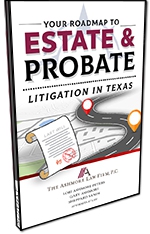A Last Will and Testament in Texas List a Person’s Wishes Following Their Death
Its purpose is supposed to let everyone know how to:
- Dispose of your property after you die.
- Appoints the executor, guardian and/or trustee.
- A Will also outlines how your assets and property will be administered.
The items listed below are what we consider the “meat” of the Will. Without the proper drafting of these provisions, The State of Texas and a judge can take control or possible Will Contests can be filed.
1. Bequests
The word, “bequest,” refers to the act of giving personal property through a Will. Below are examples of four types of bequests that you may find in a Will.
Conditional
Sometimes, a Will might have a conditional bequest. That means the bequest takes effect upon the happening or nonoccurrence of a specific event.
Executory
Another type of bequest is known as an executory bequest. It stipulates that the bequest will not be granted until an event occurs in the future, if it happens. The movie, Bachelor, with Chris O’Donnell is a prime example. In the movie, O’Donnell’s character is told that the only way he can receive his grandfather’s $100 million estate is if he is married by 6:05pm on his 30th birthday. While that might be an extreme example, it does illustrate an executory bequest.
Specific
Another type of bequest is a specific bequest. It stipulates that specific items are left to specific individuals. For example, “I specifically bequeath my Classic Porsche 911 to my nephew, Timothy Doe.”
Residuary
Another type of bequest is a residuary bequest. This is the bequest that states who gets the remainder of the property left in your estate after all debts are paid and all other bequests are made.
2. Appointments of Independent Executors, Guardians, or Trustees
Independent Executor
The person who is in charge of settling someone’s affairs.
Being an independent executor is a big job with a lot of responsibility. In fact, we often tell people this is the most “thankless” job. If you were appointed the independent executor, get ready for some work. You will have to protect your loved one’s property and ensure that all debts and taxes have been paid. Your work does not stop there. You will also have to see to it that whatever is left, is transferred to the right people.
Guardian
The person that is appointed to take care of any minor children.
When someone dies and leaves children who need to be cared for, it makes a tragic situation that much worse. A Will may specify who is listed as the guardian of the minor children upon the parent’s death. A guardian may be in charge of caring for the child or the child’s property. Sometimes a person will be appointed to look after the minor’s property, which is referred to as a “guardian of the estate.” Choosing a guardian is not easy. It can lead to hurt feelings, resentment, and confusion after the parent passes away. If you are in this situation, keep in mind that your loved one probably put a lot of thought into this decision and has a reason for choosing you.
Trustee
The person who holds legal title to the assets to distribute them as required under the terms of the Testamentary Trust found in the Will.
A Will may also include a Testamentary Trust which appoints a Trustee to hold legal title to the assets. The Will also provides the terms of the Testamentary Trust which designates the Beneficiary who is to receive the distributions.
3. Administration of Assets and Property
This is the portion of the Will that discusses who gets what upon your loved one’s death. It is one of the main purposes of a Will and is also the area that results in a lot of conflict among beneficiaries. This part of the Will talks about how the assets and property are to be transferred and to whom. You can see how it can get a little tricky. That's why it’s important to speak with a qualified estate planning attorney.
Do You Need to Speak With an Experienced Estate Planning Lawyer in the Dallas Area?
If you need to speak to an experienced estate planning attorney please contact us online or call our Dallas office directly at 214.559.7202. We help clients throughout the Dallas area with all of their estate planning needs and look forward to helping you.
Read more about Last Will and Testaments in our article, The Top 10 Must Have Parts of a Will.



